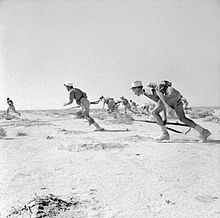French Armed Forces: Difference between revisions
Military of France
The French Armed Forces (French: Forces armées françaises) is the military of France. It consists of four military branches: the Army, Navy, Air and Space Force, and the National Gendarmerie; and a reserve force: the National Guard. The President of France serves as commander-in-chief of the French Armed Forces. France has the eigth largest defence budget in the world and the second in the European Union (EU). It also has the largest military by size in the EU.[5] According to Credit Suisse, the French Armed Forces are ranked as the world’s sixth-most powerful military.[6]
History[edit]
The military history of France encompasses an immense panorama of conflicts and struggles extending for more than 2,000 years across areas, including modern France, greater Europe, and French territorial possessions overseas. According to British historian Niall Ferguson, the French participated in 50 of the 125 major European wars that have been fought since 1495; more than any other European state. They are followed by the Austrians who fought in 47 of them, the Spanish in 44 and the English (and later British) who were involved in 43. In addition, out of all recorded conflicts which occurred since the year 387 BC, France has fought in 168 of them, won 109, lost 49 and drawn 10.[7]
The Gallo-Roman conflict predominated from 60 BC to 50 BC, with the Romans emerging victorious in the conquest of Gaul by Julius Caesar. After the decline of the Roman Empire, a Germanic tribe known as the Franks took control of Gaul by defeating competing tribes. The “land of Francia,” from which France gets its name, had high points of expansion under kings Clovis I and Charlemagne. In the Middle Ages, rivalries with England and the Holy Roman Empire prompted major conflicts such as the Norman Conquest and the Hundred Years’ War. With an increasingly centralized monarchy, the first standing army since Roman times, and the use of artillery, France expelled the English from its territory and came out of the Middle Ages as the most powerful nation in Europe, only to lose that status to Spain following defeat in the Italian Wars. The Wars of Religion crippled France in the late 16th century, but a major victory over Spain in the Thirty Years’ War made France the most powerful nation on the continent once more. In parallel, France developed its first colonial empire in Asia, Africa, and in the Americas. Under Louis XIV, France achieved military supremacy over its rivals, but escalating conflicts against increasingly powerful enemy coalitions checked French ambitions and left the kingdom bankrupt at the opening of the 18th century.

Resurgent French armies secured victories in dynastic conflicts against the Spanish, Polish, and Austrian crowns. At the same time, France was fending off attacks on its colonies. As the 18th century advanced, global competition with Great Britain led to the Seven Years’ War, where France lost its North American holdings. Consolation came in the form of dominance in Europe and the American Revolutionary War, where extensive French aid in the form of money and arms, and the direct participation of its army and navy led to America’s independence.[8] Internal political upheaval eventually led to 23 years of nearly continuous conflict in the French Revolutionary Wars and the Napoleonic Wars. France reached the zenith of its power during this period, dominating the European continent in an unprecedented fashion under Napoleon Bonaparte, but by 1815 it had been restored to its pre-Revolutionary borders. The rest of the 19th century witnessed the growth of the Second French colonial empire as well as French interventions in Belgium, Spain, and Mexico. Other major wars were fought against Russia in the Crimea, Austria in Italy, and Prussia within France itself.
Following defeat in the Franco-Prussian War, Franco-German rivalry erupted again in the First World War. France and its allies were victorious this time. Social, political, and economic upheaval in the wake of the conflict led to the Second World War, in which the Allies were defeated in the Battle of France and the French government surrendered and was replaced with an authoritarian regime. The Allies, including the government in exile’s Free French Forces and later a liberated French nation, eventually emerged victorious over the Axis powers. As a result, France secured an occupation zone in Germany and a permanent seat on the United Nations Security Council.
The imperative of avoiding a third Franco-German conflict on the scale of those of two world wars paved the way for European integration starting in the 1950s. France became a nuclear power with its first test of an atomic bomb in Algeria in 1960[9] Since the 1990s its military action is most often seen in cooperation with NATO and its European partners.
International stance[edit]
Today, French military doctrine is…
Read More: French Armed Forces: Difference between revisions

